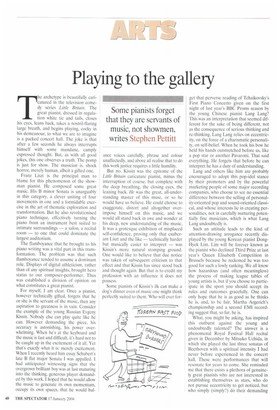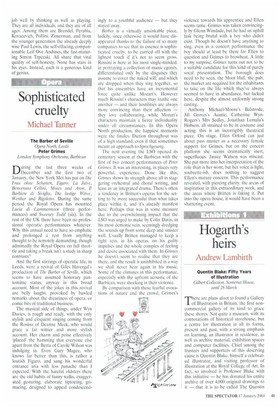Playing to the gallery
MIL MEM 11 Some pianists forget that they are servants of music, not showmen, writes Stephen Pettitt The archetype is beautifully caricatured in the television comedy series Little Britain. The great pianist, dressed in regulation white tie and tails, closes his eyes, leans back, takes a nostril-flaring large breath, and begins playing, cocky in his demeanour, to what we are to imagine is a packed concert hall. The joke is that after a few seconds he always interrupts himself with some mundane, camply expressed thought. But, as with all good jokes, this one observes a truth. The pomp is just for show. The musician is, shock horror, merely human, albeit a gifted one.
Franz Liszt is the principal man to blame for this phenomenon of the showman pianist. He composed some great music. His B minor Sonata is unarguably in this category, a clever uniting of four movements in one and a formidable exercise in the art of thematic exploration and transformation. But he also revolutionised piano technique, effectively turning the piano from an instrument best suited to intimate surroundings — a salon, a recital room — to one that could dominate the largest auditorium.
The flamboyance that he brought to his piano writing was a vital part in this transformation. The problem was that such flamboyance tended to assume a dominant role. Displays of digital athleticism, rather than of any spiritual insights, brought hero status to our composer-performer. Thus was established a division of opinion on what constitutes a great pianist.
For myself, I am clear. Once a pianist, however technically gifted, forgets that he or she is the servant of the music, then any aspiration to greatness is in vain. Consider the example of the young Russian Evgeny Kissin. Nobody else can play quite like he can. However demanding the piece, his accuracy is astonishing, his power overwhelming. When he's at the keyboard and the music is fast and difficult, it's hard not to be caught up in the excitement of it all. Yet that's exactly what it is: merely excitement. When I recently heard him essay Schubert's late B flat major Sonata I was appalled. I had anticipated witnessing signs that the overgrown brilliant boy was at last maturing into the thinking, generous player demanded by this work. I hoped that he would allow the music to generate its own momentum, occupy its own spaces, that he would bal ance voices carefully, phrase and colour unaffectedly, and above all realise that to do this work justice requires a little humility.
But no. Kissin was the epitome of the Little Britain caricature pianist, minus the interruption of course, but complete with the deep breathing, the closing eyes, the leaning back. He was the great, all-understanding master of this muse, or so he would have us believe. He could choose to exaggerate, distort and altogether overimpose himself on this music, and we would all stand back in awe and wonder at his deep, new understanding of the music. It was a grotesque exhibition of misplaced self-confidence, proving only that exuberant Liszt and the like — technically harder but musically easier to interpret — was Kissin's more natural stomping ground. One would like to believe that due notice was taken of subsequent criticism to that effect and that Kissin has since stood back and thought again. But that is to credit my profession with an influence it does not possess.
Some pianists of Kissin's ilk can make a dog's dinner even of music one might think perfectly suited to them. Who will ever for get that perverse reading of Tchaikovsky's First Piano Concerto given on the first night of last year's BBC Proms season by the young Chinese pianist Lang Lang? This was an interpretation that seemed different for the sake of being different, not as the consequence of serious thinking and re-thinking. Lang Lang relies on eccentricity, on the force of a charismatic personality, on self-belief. When he took his bow he held his hands outstretched before us, like a pop star or another Pavarotti. That said everything. He forgets that before he can interpret he has a duty of understanding.
Lang and others like him are probably encouraged to adopt this pop-idol stance by their promoters and by the powerful marketing people of some major recording companies, who choose to see no essential difference between the selling of personality-oriented pop and sound-oriented classical, and whose interests lie in creating personalities, not in carefully nurturing potentially fine musicians, which is what Lang Lang undoubtedly is.
Such an attitude leads to the kind of attention-drawing arrogance recently displayed by the young Korean pianist DongHyek Lim. Lim will be forever known as the pianist who declined Third Prize at last year's Queen Elisabeth Competition in Brussels because he reckoned he was too good for such a lowly ranking. We all know how hazardous (and often meaningless) the process of making league tables of young artists is, but if you choose to participate in the sport you should accept its rules and outcomes gracefully. One can only hope that he is as good as he thinks he is, and, to be fair, Martha Argerich's championship and a second EMI recording suggest that, so far, he is.
What, you might be asking, has inspired this outburst against the young and undoubtedly talented? The answer is a phenomenal Royal Festival Hall recital given in December by Mitsuko Uchida, in which she played the last three sonatas of Beethoven with a spiritual intensity I had never before experienced in the concert hall. These were performances that will resonate for years to come. She reminded me that there exists a plethora of genuinely great pianists who are not interested in establishing themselves as stars, who do not pursue eccentricity to get noticed, but who simply (simply?) do their demanding job well by thinking as well as playing. They are all individuals, and they are of all ages. Among them are Brendel, Perahia, Kovacevich, Pollini, Zimerman, and from the younger generation the already deeply wise Paul Lewis, the self-effacing, companionable Leif Ove Andsnes, the fast-maturing Simon Trpceski. All share that vital quality of self-honesty. None has stars in his eyes. Instead, each is a generous kind of genius.



































































 Previous page
Previous page